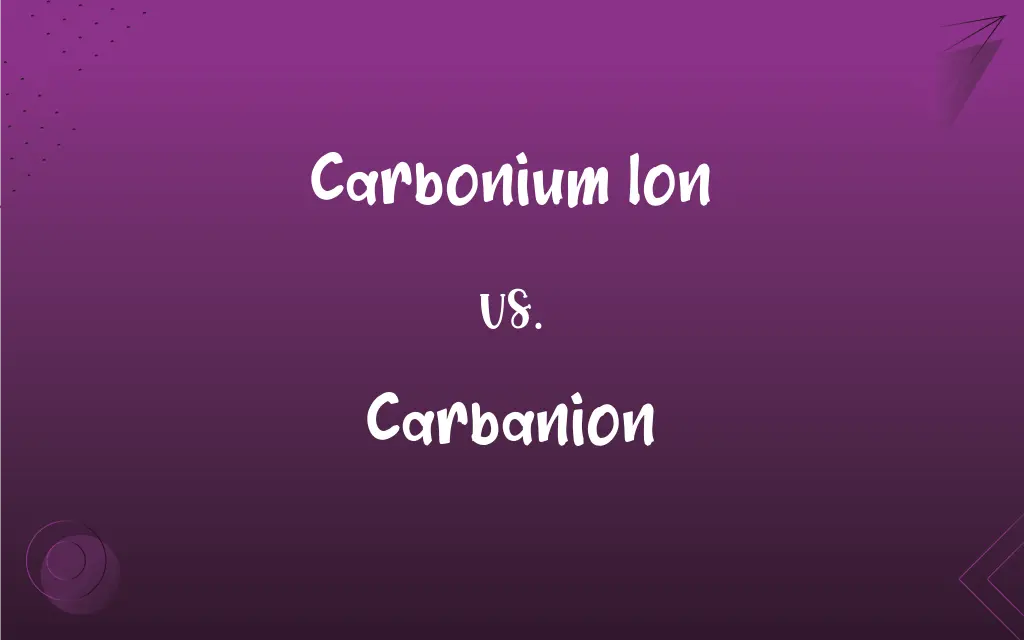Carbonium Ion vs. Carbanion: What's the Difference?
Edited by Harlon Moss || By Janet White || Published on December 20, 2023
A carbonium ion is a positively charged ion with a carbon atom, while a carbanion is a negatively charged ion also containing a carbon atom.

Key Differences
Carbonium ions are characterized by a carbon atom bearing a positive charge, often due to the loss of an electron or a bond with a more electronegative atom. Carbanions, in contrast, feature a carbon atom with a negative charge, typically resulting from gaining an electron or the presence of highly electronegative substituents.
The formation of carbonium ions involves processes like protonation or heterolytic bond cleavage, leading to a positively charged carbon. While, carbanions are formed through deprotonation or heterolytic bond cleavage where the carbon atom gains electrons.
Carbonium ions generally have a trigonal planar or tetrahedral geometry, depending on their structure and hybridization. Carbanions usually exhibit a pyramidal or trigonal planar geometry, influenced by their electronic configuration.
In chemical reactions, carbonium ions act as electrophiles, seeking electrons to pair with their positively charged carbon atom. Carbanions, being nucleophiles, are attracted to positive charges, ready to donate their extra electrons.
The stability of carbonium ions is influenced by factors such as hyperconjugation and the inductive effect of adjacent groups. Carbanion stability is determined by factors like resonance, inductive effects, and the electronegativity of substituents.
ADVERTISEMENT
Comparison Chart
Charge
Positively charged
Negatively charged
Formation
Loss of an electron or bond cleavage
Gain of an electron or deprotonation
Geometry
Trigonal planar or tetrahedral
Pyramidal or trigonal planar
Chemical Role
Electrophile
Nucleophile
Stability Factors
Hyperconjugation, inductive effects
Resonance, electronegativity of substituents
ADVERTISEMENT
Carbonium Ion and Carbanion Definitions
Carbonium Ion
An ion with a positively charged carbon atom.
Stability of the carbonium ion was key to the reaction's success.
Carbanion
An ion where a carbon atom has an extra pair of electrons.
Formation of the carbanion initiated the nucleophilic attack.
Carbonium Ion
A carbon-containing ion with a deficiency of electrons.
The carbonium ion acted as an electrophile in the synthesis.
Carbanion
A carbon-containing ion with an excess of electrons.
The carbanion's reactivity was essential in the organic synthesis.
Carbonium Ion
A positively charged ion with a central carbon atom.
The formation of a carbonium ion was crucial in the reaction mechanism.
Carbanion
A negatively charged ion with a central carbon atom.
The carbanion was stabilized by resonance in the compound.
Carbonium Ion
A species formed by the addition of a proton to a carbon atom.
Protonation of the organic compound produced a carbonium ion.
Carbanion
An ion with a negatively charged carbon atom.
The carbanion acted as a nucleophile in the reaction.
Carbonium Ion
An ion where a carbon atom has three bonds and a positive charge.
Carbonium ions are often intermediates in organic reactions.
Carbanion
A species formed by deprotonation of a carbon atom.
Deprotonation of the acid generated a carbanion.
Carbanion
An anion in which carbon carries a negative charge and an unshared pair of electrons.
Carbanion
(organic chemistry) any organic anion of general formula R3C- Category:en:Carbon
FAQs
What is the geometry of a carbonium ion?
Typically, it's trigonal planar or tetrahedral.
What is a carbonium ion?
It's a positively charged ion with a central carbon atom.
Are carbonium ions stable?
Their stability varies and depends on hyperconjugation and inductive effects.
What leads to the formation of carbanions?
Carbanions are formed by deprotonation or electron gain.
What factors affect carbanion stability?
Stability is influenced by resonance, inductive effects, and electronegativity of substituents.
What is a carbanion?
A carbanion is a negatively charged ion where the central carbon atom has an extra electron.
In what reactions are carbonium ions common?
They are common in many organic reactions, particularly as intermediates.
Can carbonium ions act as nucleophiles?
No, they are electrophiles due to their positive charge.
Why is resonance important for carbanion stability?
Resonance delocalizes the negative charge, leading to greater stability.
How are carbonium ions formed?
They form through protonation or heterolytic bond cleavage.
What geometry do carbanions exhibit?
They usually have a pyramidal or trigonal planar structure.
How does hyperconjugation affect carbonium ion stability?
Hyperconjugation helps distribute the positive charge, enhancing stability.
Are carbanions electrophiles or nucleophiles?
Carbanions are nucleophiles, ready to donate their extra electrons.
What is the role of carbonium ions in acid-base chemistry?
They often act as intermediates in acid-catalyzed reactions.
Do carbonium ions favor certain solvents?
They are often stable in non-polar or slightly polar solvents.
How does solvent affect carbanion reactivity?
Solvent polarity can significantly impact carbanion stability and reactivity.
Can the stability of carbonium ions predict reaction outcomes?
Yes, their stability can influence the course and speed of chemical reactions.
Where are carbanions typically found?
In organic synthesis, especially in nucleophilic reactions.
What is the significance of carbanions in synthesis?
They are key in forming carbon-carbon bonds in organic synthesis.
How do carbanions participate in organic reactions?
They typically act as bases or nucleophiles in organic synthesis.
About Author
Written by
Janet WhiteJanet White has been an esteemed writer and blogger for Difference Wiki. Holding a Master's degree in Science and Medical Journalism from the prestigious Boston University, she has consistently demonstrated her expertise and passion for her field. When she's not immersed in her work, Janet relishes her time exercising, delving into a good book, and cherishing moments with friends and family.
Edited by
Harlon MossHarlon is a seasoned quality moderator and accomplished content writer for Difference Wiki. An alumnus of the prestigious University of California, he earned his degree in Computer Science. Leveraging his academic background, Harlon brings a meticulous and informed perspective to his work, ensuring content accuracy and excellence.






































































